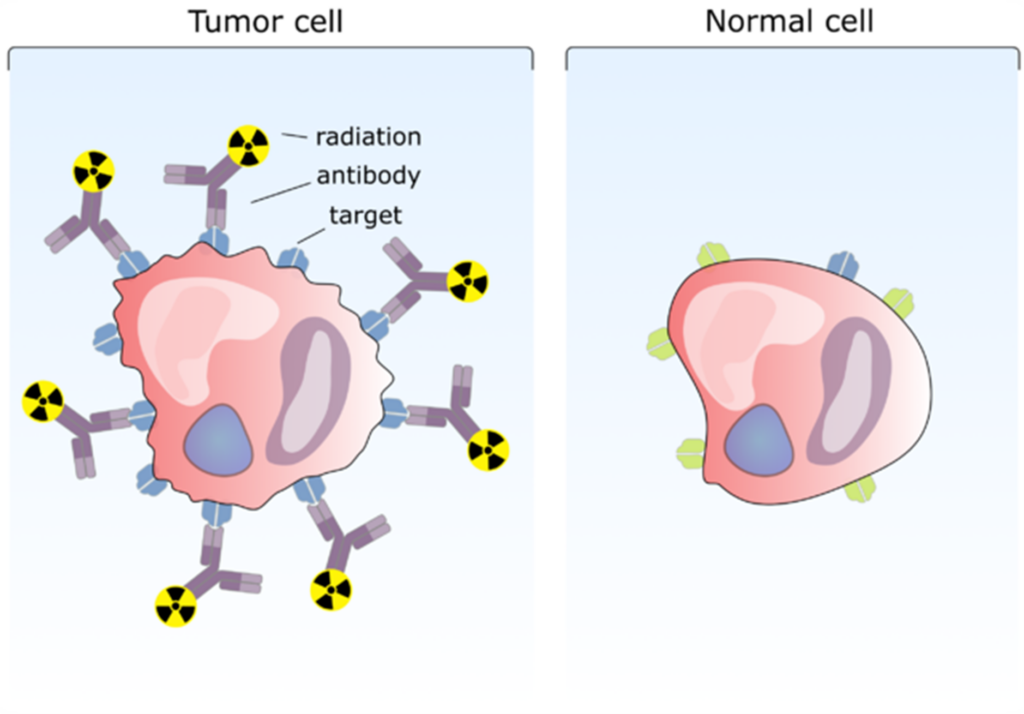A New Type of Treatment
Akiram is leading the development of molecular radiotherapy as a novel treatment for CD44v6 expressing cancers. This innovative approach has demonstrated exceptional efficacy in treating various other types of cancer as well.
A Therapeutic Challenge – Treating Advanced Metastasized Cancer
Progress in the diagnostics and treatment of cancer has led to a significantly improved survival rate, but for many types of cancer, the survival rate remains poor. Cancer in a metastatic setting is still a death sentence.
Akiram’s Advancements in Targeted Cancer Therapy
Targeting CD44v6 with Precision and Innovation
Akiram’s breakthrough in molecular radiotherapy centers on a drug candidate designed to target CD44v6, a protein highly expressed in various aggressive cancers but minimally in healthy tissues. This strategic focus ensures the treatment precisely impacts tumors while sparing normal cells. The development of a proprietary antibody against CD44v6, coupled with the radioactive isotope Lutetium-177, highlights the company’s innovative approach to selectively attack cancer cells. This antibody, selected for its strong binding and low immunogenicity, is key to the therapy’s targeted delivery.
Enhanced Treatment Efficacy and Precision with Diagnostic Imaging
In addition to its therapeutic benefits, 177Lu-AKIR001 can also be utilized for diagnostic imaging to guide treatment. This imaging approach allows for the evaluation of antibody biodistribution and tumor accumulation, enabling physicians to anticipate patient responses and tailor dosing accordingly. By employing this imaging technique, treatment efficacy in clinical studies can be significantly improved, reducing healthcare costs associated with ineffective therapies, and providing a more personalized and cost-effective treatment approach
A Promising Future in Cancer Treatment
By integrating targeted therapy with advanced diagnostic tools, Akiram aims to provide a more effective and personalized approach to treating advanced cancers. This combined strategy represents a significant step forward in the fight against cancer, offering hope for improved outcomes for patients facing resistance to conventional treatments.
Molecular Radiotherapy: The Best of Two Worlds
Molecular radiotherapy is increasingly becoming a powerhouse in targeted cancer and radiation therapy. Many have recently discovered the potential of radioactive cancer-targeting drugs, and it is described as “the next wave after immunotherapy” (National Cancer Institute, 2020) and to “storm the market”.
Molecular radiotherapy combines the advantages of molecular targeting with the therapeutic effect of radiation
- Molecular targeting: an antibody or other molecule that binds specifically to proteins highly expressed in cancer cells is used to deliver an active substance causing a therapeutic effect to tumour cells.
- Radiotherapy: radiation killing the cancer cells. But traditional radiation also kills surrounding cells, leading to side effects.
The combination, molecular radiotherapy, combines the significant benefits of the two: an antibody (or another molecule) delivers the radiation (active substance) only to the cancer cells – while leaving healthy cells untouched.
Another key benefit is that this treatment kills spread metastases since they express the same protein (drug target) as the original tumour.

The image illustrates an antibody delivering radiation to a cancer cell by binding to a protein highly expressed in cancer cells while not binding to normal cells where this protein is not highly expressed.
